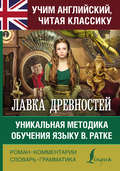
Чарльз Диккенс
Большие надежды. Уровень 2 / Great Expectations
Chapter 16
I took Biddy into our little garden, and talked to her.
“Biddy,” said I, “please help Joe, a little, when I’m in London.”
“How to help him?” asked Biddy.
“Well! Joe is a dear good fellow – in fact, I think he is the dearest fellow in the world – but he is rather backward in some things. For instance, Biddy, in his manners.”
Although I was looking at Biddy as I spoke, and although she opened her eyes very wide, she did not look at me.
“O, his manners!” said Biddy. “Don’t you think he may be proud?”
“Proud?” I repeated.
“There are many kinds of pride,” said Biddy. “He may be too proud.”
I put my best clothes on, and I went into town to visit the shops and presented myself before Mr. Trabb, the tailor.
“Well!” said Mr. Trabb. “What can I do for you?”
“Mr. Trabb,” said I, “I am going to London, and I want a fashionable suit of clothes.”
“My dear sir,” said Mr. Trabb, “May I congratulate you? Will you step into the shop?”
I selected the materials for a suit, with the assistance of Mr. Trabb. Mr. Trabb measured and calculated me in the parlor.
After this memorable event, I went to the hatter’s, and the bootmaker’s, and the hosier’s. I also went to the coach-office[44] and took my place for seven o’clock on Saturday morning.
So, Tuesday, Wednesday, and Thursday, passed; and on Friday morning I went to pay my visit to Miss Havisham. I rang at the bell constrainedly. Sarah Pocket came to the gate, and reeled back when she saw me.
“You?” said she. “You? Good gracious! What do you want?”
“I am going to London, Miss Pocket,” said I, “and want to say goodbye to Miss Havisham.”
Miss Havisham was taking exercise in the room with the long spread table. She stopped and turned.
“Don’t go, Sarah,” she said. “Well, Pip?”
“I start for London, Miss Havisham, tomorrow, and I want to say goodbye.”
“Ay, ay!” said she. “I saw Mr. Jaggers and heard about your fortune, Pip. So you go tomorrow?”
“Yes, Miss Havisham.”
“And you are adopted by a rich person?”
“Yes, Miss Havisham.”
“Not named?”
“No, Miss Havisham.”
“And Mr. Jaggers is your guardian?”
“Yes, Miss Havisham.”
“Well!” she went on; “you have a career before you. Be good – deserve it – and abide by Mr. Jaggers’s instructions.”
She looked at me, and looked at Sarah.
“Goodbye, Pip! You will always keep the name of Pip, you know.”
“Yes, Miss Havisham.”
“Goodbye, Pip!”
She stretched out her hand, and I went down on my knee and put it to my lips. Sarah Pocket conducted me down. I said “Goodbye, Miss Pocket.”
Chapter 17
The journey from our town to the metropolis was a journey of about five hours. Mr. Jaggers sent me his address. We stopped in a gloomy street, at certain offices with an open door, whereon was painted MR. JAGGERS.
I went into the front office with my little portmanteau in my hand and asked,
“Is Mr. Jaggers at home?”
“He is not,” returned the clerk. “He is in Court at present. Am I addressing Mr. Pip?”
I signified that he was addressing Mr. Pip.
“Please wait in Mr. Jaggers’s room.”
Mr. Jaggers’s room was a very dismal place. There were not so many papers about; and there were some odd objects about – such as an old rusty pistol, a sword in a scabbard, several strange-looking boxes and packages.
My guardian took me into his own room, and informed me what arrangements he made for me. I must go to “Barnard’s Inn[45],” to young Mr. Pocket’s rooms, where a bed was sent in for my accommodation.
“You will find it good, Mr. Pip,” said my guardian, “but I shall be able to check your bills.”
Chapter 18
Mr. Wemmick was a dry man, rather short in stature, with a square wooden face.
“So you were never in London before?” said Mr. Wemmick to me.
“No,” said I.
“I was new here once,” said Mr. Wemmick.
“You are well acquainted with it now?”
“Why, yes,” said Mr. Wemmick.
“Is it a very wicked place?” I asked.
“You may get cheated, robbed, and murdered in London. But there are plenty of people anywhere, who’ll do that for you.”
“Do you know where Mr. Matthew Pocket lives?” I asked Mr. Wemmick.
“Yes,” said he. “At Hammersmith, west of London.”
“Is that far?”
“Well! Say five miles.”
“Do you know him?”
“Yes, I know him. I know him!”
Barnard’s Inn. Is it Mr. Barnard’s hotel, indeed? But the realization of the first of my great expectations was imperfect. Mr. Wemmick led me into a corner and conducted me up a flight of stairs- to a set of chambers on the top floor. MR. POCKET, JUN., was painted on the door, and there was a label on the letter-box, “Return shortly[46].”
“You don’t want me anymore?” asked Mr. Wemmick.
“No, thank you,” said I.
“As I keep the cash,” Mr. Wemmick observed, “we shall most likely meet pretty often. Good day.”
“Good day.”
When he left, I opened the staircase window. I was saying to myself that London was decidedly overrated.
Mr. Pocket, Junior, returned in half an hour. He had a paper-bag under each arm and a pottle of strawberries in one hand, and was out of breath.
“Mr. Pip?” said he.
“Mr. Pocket?” said I.
“Dear me!” he exclaimed. “I am extremely sorry. I think you will like a little fruit after dinner. So I went to Covent Garden Market[47] to get it. Pray come in, allow me to lead the way. We will take a walk about London. I am sure I shall be very happy to show London to you. As to our table, you won’t find that bad, I hope, for it will be supplied from our coffee-house here[48]. As to our lodging, it’s not by any means splendid, because I have my own bread to earn, and my father hasn’t anything to give me. This is our sitting-room – just such chairs and tables and carpet and so forth, you see. This is your bedroom. If you want anything, I’ll go and fetch it. The chambers are retired, and we shall be alone together, but we shan’t fight, I dare say. But, I beg your pardon, you’re holding the fruit all this time. Pray let me take these bags from you. I am quite ashamed.”
Suddenly Mr. Pocket, Junior, said,
“Lord bless me, you’re the prowling boy!”
“And you,” said I, “are the pale young gentleman!”
Chapter 19
“Well!” said the pale young gentleman, “it’s all over now, I hope you’ll forgive me.”
I derived from this speech that Mr. Herbert Pocket (for Herbert was the pale young gentleman’s name) did not remember anything.
“That day Miss Havisham sent for me on a trial visit. I was meant to be engaged to Estella.”
“How did you bear your disappointment?” I asked.
“Pooh!” said he, “I didn’t care much for it. She’s a Tartar[49].”
“Miss Havisham?”
“I don’t say no to that, but I meant Estella. That girl is hard and haughty and capricious to the last degree. She was brought up by Miss Havisham to wreak revenge on all the male sex[50].”
“What relation is she to Miss Havisham?”
“None,” said he. “Only adopted.”
“What revenge do you mean?”
“It’s quite a story, we’ll talk about it later. Mr. Jaggers is your guardian, I understand?” he went on.
“Yes.”
“You know he is Miss Havisham’s man of business and solicitor, and has her confidence?”
I answered with a constraint, that I saw Mr. Jaggers in Miss Havisham’s house.
“He was so obliging[51] as to suggest my father for your tutor. Of course he knew about my father from his connection with Miss Havisham. My father is Miss Havisham’s cousin.”
Herbert Pocket was still a pale young gentleman. He had not a handsome face, but it was better than handsome: it was extremely amiable and cheerful. His figure was a little ungainly.
As he was so communicative, I told him my small story. I mentioned that I was brought up in a country place, and knew very little of the ways of politeness. So I will take it as a great kindness in him if he gives me a hint whenever he saw something wrong.
“With pleasure,” said he, “Will you do me the favour to begin at once to call me by my Christian name, Herbert?”
I informed him in exchange that my Christian name was Philip.
“No,” said he, smiling, “Would you mind Handel[52] for a familiar name? There’s a charming piece of music by Handel, called the Harmonious Blacksmith[53].”
“Handel – why not?”
“Then, my dear Handel,” said he, “here is the dinner!”
It was a nice little dinner. Everything was delightful. We had made some progress in the dinner, when I reminded Herbert of Miss Havisham.
“True,” he replied. “And Handel, in London it is not the custom to put the knife in the mouth – for fear of accidents – the fork is reserved for that use.”
He offered these friendly suggestions in such a lively way, that we both laughed and I scarcely blushed.
“Now,” he pursued, “concerning Miss Havisham. Miss Havisham, you must know, was a spoilt child. Her mother died when she was a baby, and her father denied her nothing[54]. Her father was a country gentleman down in your part of the world, and was a brewer. Well! Mr. Havisham was very rich and very proud. So was his daughter.”
“Miss Havisham was an only child?” I hazarded.
“Stop a moment, I am coming to that. No, she was not an only child; she had a half-brother[55]. Her father privately married again – his cook, I rather think.”
“I thought he was proud,” said I.
“My good Handel, so he was. He married his second wife privately, because he was proud, and in course of time she died. When she was dead, I apprehend he first told his daughter everything, and then the son became a part of the family. As the son grew a young man, he turned out riotous, extravagant, undutiful – altogether bad. At last his father disinherited him. But he softened when he was dying, and gave him something, though less than to Miss Havisham. Miss Havisham was now an heiress. Her half-brother had debts. Now, I come to the cruel part of the story. There appeared a certain man, who made love to Miss Havisham. I never saw him (for this happened five-and-twenty years ago, before you and I were, Handel), but my father mentioned that he was a showy man[56]. Well! This man pursued Miss Havisham closely, and she passionately loved him. There is no doubt that she perfectly idolized him. Your guardian was not at that time in Miss Havisham’s counsels. She was too haughty and too much in love. Her relations were poor and scheming, with the exception of my father; he was poor enough, but not jealous. The only independent one among them, he warned her that she was doing too much for this man. She angrily ordered my father out of the house, in his presence, and my father did not see her anynore.”
I remember her words, “Matthew will come and see me at last when I am laid dead upon that table.” So I asked Herbert whether his father was so inveterate against her?
“It’s not that,” said he, “to return to the man and make an end of him. The marriage day was fixed, the wedding dresses were bought, the wedding tour was planned out, the wedding guests were invited. The day came, but not the bridegroom. He wrote her a letter – ”
“Which she received,” I said, “when she was dressing for her marriage? At twenty minutes to nine?”
“Yes,” Herbert nodded, “at which she afterwards stopped all the clocks.”
“Is that all the story?” I asked.
“All I know of it. They think that the man to whom she gave her misplaced confidence acted throughout in concert[57] with her half-brother. They shared the profits.”
“I wonder he didn’t marry her and get all the property,” said I. “What became of the two men?”
“They fell into deeper shame and degradation – if there can be deeper – and ruin.”
“Are they alive now?”
“I don’t know.”
“You said just now that Estella was not related to Miss Havisham, but adopted. When adopted?”
Herbert shrugged his shoulders.
“Estella was always with Miss Havisham. I really don’t know. And now, Handel, all that I know about Miss Havisham, you know.”
“And all that I know,” I retorted, “you know.”
Chapter 20
On the Monday morning at a quarter before nine, Herbert went to the counting-house. Then we took coach for Hammersmith. We arrived there at two or three o’clock in the afternoon, and walked to Mr. Pocket’s house. We passed into a little garden, where Mr. Pocket’s children were playing about.
Mrs. Pocket was sitting on a garden chair under a tree and reading. “Mamma,” said Herbert, “this is young Mr. Pip.”
Mr. Pocket said he was glad to see me, and he hoped I was not sorry to see him. He was a young-looking man, in spite of his very gray hair. His manner seemed quite natural. When he was talking to me, he said to Mrs. Pocket, “Belinda, I hope you welcomed Mr. Pip?” And she looked up from her book, and said, “Yes.” She then smiled upon me in an absent state of mind, and asked me if I liked the taste of orange-flower water.
Mrs. Pocket was the only daughter of a certain gentleman. Mr. Pocket was educated at Harrow and at Cambridge. He married Mrs. Pocket very early in life and came to London.
After dinner the children were introduced. There were four little girls, and two little boys. Soon the evening came.
There was a sofa where Mr. Pocket stood, and he dropped upon it. Then he said, “Good night, Mr. Pip.” So I decided to go to bed and leave him.
Chapter 21
After two or three days, Mr. Pocket and I had a long talk together. He knew more of my intended career than I knew myself.
“If I buy the furniture,” said I, “and one or two other little things, I shall be quite at home there.”
“Go!” said Mr. Jaggers, with a short laugh. “Well! How much do you want?”
I said I didn’t know how much.
“Come!” retorted Mr. Jaggers. “How much? Fifty pounds?”
“O, not nearly so much.”
“Five pounds?” said Mr. Jaggers.
“O, more than that.”
“More than that, eh!” retorted Mr. Jaggers, with his hands in his pockets, his head on one side, and his eyes on the wall behind me; “how much more?”
“It is so difficult to fix a sum,” said I.
“Come!” said Mr. Jaggers. “Twice five; will that do?[58] Three times five; will that do? Four times five; will that do?”
“Twenty pounds, of course.” said I, smiling.
“Wemmick!” said Mr. Jaggers and opened his office door. “Take Mr. Pip’s written order, and pay him twenty pounds.”
Wemmick was at his desk. He was eating a dry hard biscuit; pieces of which he threw from time to time into his slit of a mouth.
I asked if there were many clerks? Wemmick replied,
“We don’t run much into clerks[59], because there’s only one Jaggers. There are only four of us. Do you want to see them? You are one of us, as I may say.”
I accepted the offer. When Mr. Wemmick paid me my money from a cash-box in a safe, we went up stairs. The house was dark and shabby. In the front first floor, a clerk was attentively engaged with three or four people of shabby appearance. In the room over that, a little flabby clerk with dangling hair was similarly engaged with a man with weak eyes. In a back room, a high-shouldered man[60], who was dressed in old black clothes, was stooping over his work. He was making copies of the notes of the other two gentlemen, for Mr. Jaggers’s own use.
This was all the establishment. When we went downstairs again, Wemmick led me into my guardian’s room, and said,
“When you have nothing better to do, come over to see me at Walworth. I can offer you a bed.”
I was delighted to accept his hospitality.
“Thank you,” said he. “When you go to dine with Mr. Jaggers, look at his housekeeper.”
“Shall I see something very uncommon?”
“Well,” said Wemmick, “you’ll see a wild beast tamed.”






